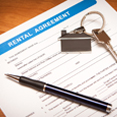Are Landlords Risking Their Investment by Neglecting Pre-Winter Checks?

Landlords are being urged to take urgent action to ensure their investment properties are ready for winter so that they avoid facing disgruntled tenants and potential void periods. The warning comes after it was revealed that nearly half of private landlords fail to carry out routine maintenance on their portfolio before bad weather sets in.
Research carried out by online letting agent Upad.co.uk amongst over 4,000 private landlords shows how just 52% planned ahead by carrying out necessary checks during the summer months – a time when any issues can be rectified before they become more critical and when disruption to tenants can be kept to a minimum.
Speaking of the research findings, James Davis, CEO and founder of Upad and himself a portfolio landlord, said: “Whilst it’s encouraging to see a slight majority of private landlords investing the time and money to carry out certain routine maintenance checks, the fact remains that almost half are failing to do so.
“Those who don’t act in plenty of time, run the risk of any issues escalating and, therefore, costing more to rectify. This is not only a drain on the landlord’s finances, but can also lead to unhappy tenants who may choose to look for alternative accommodation if the disruption becomes too much to live with.”
Amongst those landlords who do commit to routine inspections, 73% ensure checks and necessary maintenance are carried out on the heating boiler, yet only 55% extend this to all aspects of the heating systems including pipework and radiators. A similarly low number extend their checks to outside the property with just 55% clearing drainpipes and guttering and 27% carrying out roof checks and maintenance.
Liz Williams, a Marketing Consultant from Ledbury, has first-hand experience of dealing with a mid-winter maintenance issue whilst renting a property:
“My husband and I moved to Herefordshire from London just before our first child was born and decided to rent whilst looking for our dream family home.
“Christmas fell just two weeks after Samuel was born and whilst we spent Christmas with family, we returned home on Boxing Day with thick snow on the ground to find that our boiler had stopped working. Calls to the lettings agent proved futile given the time of year, but we fortunately had the contact details of the landlord who agreed to pay for a night in a nearby hotel for us.
“On returning home to be present for a constant stream of heating engineers, we found ourselves camping out in our lounge to keep ourselves and our new-born baby warm near the fire and an array of portable radiators.
“The boiler was eventually mended but we always felt the landlord himself should have had a better grasp on its overall working order and that he certainly should have been better prepared with the necessary contacts to call upon in an emergency situation such as this.”
John Socha has been a landlord for over 20 years and now operates a portfolio of 25 properties in Northampton. For him, pre-winter maintenance checks aren’t just about avoiding inconvenience when things go wrong:
“Being on top of essential maintenance before bad weather sets in, isn’t just about maintaining positive relations with your tenants, as important as that is, it also makes sound financial sense.
“Far from taking a ‘sticking plaster’ approach when things go wrong, I’ve instead decided to invest up front to mitigate potentially more costly repairs at a later stage.
“For example, all of my properties with gas central heating are signed up to a yearly maintenance and servicing policy. This not only means that it is regularly checked with any niggles rectified, but also that, should something go wrong, the tenant can call the engineer out, safe in the knowledge that they’ll have the issue dealt with quickly. For me, I’m also reassured that there won’t be any of the extortionate costs that can be associated with emergency call outs
“Of course, issues aren’t always linked to the heating and so, once autumn leaf-fall is over, I ensure that all the gutters on my properties are cleared. I’ve also recently changed all exterior lights to LEDs so that there’s less frequent need for bulb changes and have checked that outside taps are suitably insulated.”
James Davis concludes: “Whilst it’s easy when you don’t live in a property to be less aware of its overall condition, we advise landlords to commit to regular maintenance checks and, therefore, avoid small issues escalating to larger, costlier, ones.
“John is a great example of this. He appreciates that there’s no point in scrimping on essential maintenance and that small improvements and regular checks, can pay dividends via improved tenant relationships and less inconvenience all-round.”







